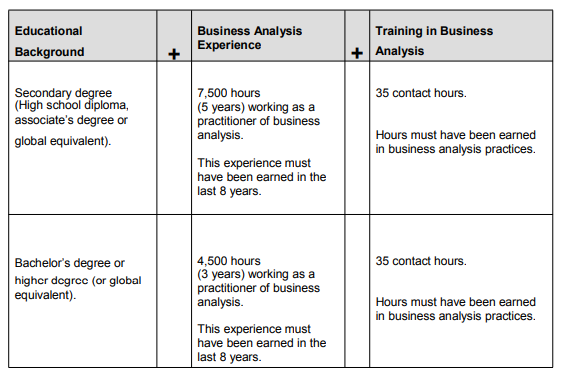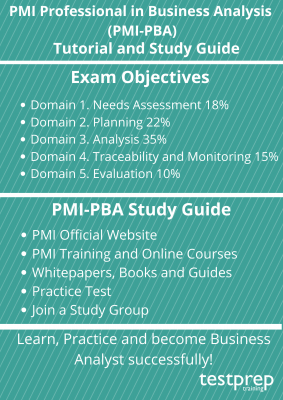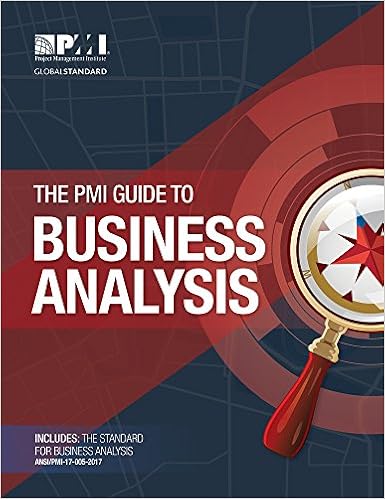If you are aiming to stand out as a business analyst, land high-paying roles, or drive projects with precision, PMI-PBA (Professional in Business Analysis) is the game-changer certification you need. With businesses increasingly relying on skilled analysts to bridge the gap between strategy and execution, PMI-PBA is not just another certificate; it’s your ticket to credibility, recognition, and career acceleration. In this guide, we will break down everything you need to know to conquer the PMI-PBA exam in 2025 – from eligibility, domains, and resources to expert tips and proven strategies. Whether you’re a seasoned professional or just stepping into business analysis, this roadmap will make your preparation laser-focused and stress-free.
PMI-PBA: Professional in Business Analysis Exam Overview
PMI is well-known, and if you want a career in business analysis and managing resources in projects, then PMI-PBA is the right choice to consider. If you have made your choice to build a career or want to upgrade your skills for better learning opportunities then here is an ultimate learning guide to help you with all the study resources to prepare better. So before we start preparing let’s get some basic details of the exam so that we don’t miss on any learning concepts.
The PMI Professional in Business Analysis (PMI-PBA) certification recognizes someone’s skill in business analysis. Moreover, having the PMI Professional in Business Analysis (PMI-PBA) Certification is highly respected in the professional world. To get it, you need a mix of business analysis training, hands-on project experience, and passing an exam about business analysis methods, practices, tools, and techniques. Moreover, this global certification also supports individuals in meeting the needs of organisations. These organisations rely on business analysis practitioners to play key roles on their teams. Therefore, becoming accredited as a business analysis (BA) expert provides your career with a fresh direction, given its increasing demand.
Roles and Responsibilities of a PMI-PBA Certified Professional
A PMI-PBA certified professional is not just someone who understands business processes—they are the bridge between business needs and successful project outcomes. Their core responsibilities include:
- Eliciting Requirements Effectively – Gathering and understanding the needs of stakeholders through interviews, workshops, surveys, and observations.
- Analyzing and Documenting Requirements – Translating stakeholder needs into clear, actionable requirements that guide project teams.
- Stakeholder Engagement – Building strong relationships with stakeholders, managing expectations, and ensuring alignment throughout the project ifecycle.
- Solution Assessment and Validation – Evaluating proposed solutions to ensure they meet business needs, and identifying gaps or risks before implementation.
- Managing Requirements Changes – Tracking, assessing, and controlling changes to requirements to minimize project risks and scope creep.
- Facilitating Decision-Making – Providing insights and recommendations that help organizations make informed, data-driven business decisions.
- Ensuring Business Value – Acting as a champion for the business by ensuring projects deliver tangible benefits and align with strategic goals.
Industries and Sectors Where PMI-PBA is Highly Valued
PMI-PBA certification is recognized across a wide array of industries because every sector needs skilled professionals who can turn business needs into actionable solutions. Some key industries include:
- Information Technology (IT) & Software Development – Leading requirements analysis for software projects, system integrations, and digital transformations.
- Finance & Banking – Defining and analyzing processes for compliance, risk management, and financial systems.
- Healthcare & Life Sciences – Managing projects related to patient care systems, medical software, and regulatory compliance.
- Telecommunications – Driving solutions for network operations, customer experience, and service innovations.
- Consulting & Professional Services – Providing expertise in process improvement, strategy implementation, and client solutions.
- Government & Public Sector – Leading initiatives for policy implementation, infrastructure projects, and citizen-focused services.
- Retail & E-commerce – Streamlining business processes, enhancing customer experience, and supporting digital transformation initiatives.
Who should take this PMI-PBA exam?
If the candidate works with project teams and manages requirements or product development, or if they are a project or program manager who performs business analysis in their role, then the PMI Professional in Business Analysis certification is the right choice for them.
PMI PBA Certification Requirements
- Secondary degree (high school diploma, associate’s degree
- Business analysis experience
- Education in business analysis
- Bachelor’s degree or the global equivalent

Since we have all details handy we will now start placing our cards so as to design a proper learning path for better preparation plan and with expert guidance to sail through swiftly.
Professional in Business Analysis PMI-PBA Study Guide 2025
Passing the PMI Professional in Business Analysis (PMI-PBA) exam is quite challenging. It requires a lot of dedication and determination. Fortunately, there are many study materials available to help you succeed in this exam. Using the right resources is crucial for doing well. Additionally, having a clear study plan will greatly assist in your preparation. So, this PMI PBA Study Guide will serve as a guide for your success and provide support throughout your journey to passing the exam.

Step 1- Visit PMI Official Website
Visiting the PMI official website is a necessary step while preparing for the PMI Professional in Business Analysis (PMI-PBA) exam. The official site proposes a lot of information and sources which is very important in preparing for the exam. You can find all such important things on the official page. Also, familiarising yourself with the exam course is really beneficial. This PMI Professional In Business Analysis (PMI-PBA) Course covers the following 5 domains:
Domain 1: Needs Assessment
This domain focuses on concepts to define or review a business problem or opportunity using problem and opportunity analysis techniques. Also, collect and analyze information from a variety of sources using valuation tools and techniques to contribute to determining the value proposition of the initiative. Moreover, collaborate in the development of project goals and objectives by providing clarification of business needs and solution scope. Further, identify stakeholders by reviewing goals, objectives, and requirements in order that the appropriate parties are represented, informed and involved. Lastly, determine stakeholder values regarding the product, using elicitation techniques.
Domain 2: Planning
This domain aims at building an understanding to review the business case, and the project goals and objectives. Further, define strategy for requirements traceability using traceability tools and techniques in order to establish the level of traceability necessary to monitor and validate the requirements. Develop requirements management plan by identifying stakeholders, roles and responsibilities, communication protocols, and methods for eliciting, analyzing, documenting, managing, and approving requirements. Also, select methods for requirements change control by identifying channels for communicating requests and processes for managing changes. Select methods for document control by using documentation management tools and techniques. Moreover, define business metrics and acceptance criteria by collaborating with stakeholders for use in evaluating when the solution meets the requirements.
Domain 3: Analysis
This domain includes the concepts to elicit or identify requirements, using individual and group elicitation techniques. Also, analyze, decompose, and elaborate requirements using techniques such as dependency analysis, interface analysis, and data and process modelling. Further, evaluate product options and capabilities by using decision-making and valuation techniques. Moreover, allocate accepted or deferred requirements by balancing scope schedule, budget, and resource constraints with the value proposition using prioritization, dependency analysis, and decision-making tools and techniques. Not to mention, obtain sign-off on requirements baseline using decision-making techniques. Furthermore, requirements specifications using processes data, and interface details. Lastly, validate requirements using tools and techniques such as documentation review, prototypes, demos, and other validation methods.
Domain 4: Traceability and Monitoring
This domain covers the topics to track requirements using a traceability artifact or tools, capturing the requirements’ status, sources and relationships. Then, monitor requirements throughout their life cycles using a traceability artifact or tool. Also, update a requirement’s status as it moves through its lifecycle states by communicating with appropriate stakeholders and recording changes in the traceability artifact or tool. Moreover, communicate requirements status to project manager and other stakeholders using communication methods. Manage changes to requirements by assessing impacts, dependencies, and risks in accordance with the change control plan, and comparing to the requirements.
Domain 5: Evaluation
Lastly, this domain is much focused on concepts to validate the solution’s test results, reports, and other test evidence against the requirements acceptance criteria. Also, analyse and communicate the solution’s identified gaps and deltas using quality assurance tools and methods. Further, obtain stakeholder sign-off on the developed solution using decision-making techniques. Moreover, evaluate the deployed solution using valuation techniques.
Step 2- PMI Training and Online Courses
You can also opt for the PMI PBA Certification Online Training programs and online courses. PMI offers training programs on every exam. The training programs for a particular exam contain all information of the exam such as description, intended audience, delivery method, duration etc. Therefore, you should join a training program to gain knowledge and skills for PMI Professional in Business Analysis (PMI-PBA).
Step 3- Whitepapers, Books and Guides
The next step in the preparatory guide should be whitepapers, books and study guides. You need to find those books which are enriched with information. It is advised to refer the PMI-PBA Books from authentic and genuine resources only. Here, we are recommending some books and guides:

- The PMI Guide to Business Analysis Paperback by Project Management Institute.
- Business Analysis for Practitioners: A Practice Guide Paperback by Project Management Institute
- Achieve Business Analysis Certification: A Concise Guide to PMI-PBA, CBAP and CPRE Exam Success Pap/Psc Edition, by Klaus Nielsen
Step 4- Join a Study Group
Online forums and study groups play a critical role in preparing for an exam. Moreover, these forums help you learn from the experts. Also online forums are fruitful as they connect you with other candidates appearing for the same exam. Furthermore, they provide valuable insights in the certification and also bring clarity to your doubts. Therefore, joining an online group is essential part of your preparations.
Step 5 – Self-Evaluate with Practice Test
Finally, it is time to self-evaluate. PMI PBA Practice Tests help you keep a check on your preparations. These tests familiarise you with the exam environment and also identify your weaker areas. Strengthening your weaker domains will surely help you pass the exam with flying colours. Attempting multiple tests will boost your confidence. Start Practising Now!
Tips and Tricks for Exam Success
Cracking the PMI-PBA exam is not just about studying hard—it’s about studying smart. Here’s how to approach it effectively:
- Time Management During the Exam – The PMI-PBA exam is timed, so pacing yourself is crucial. Divide your time per question and stick to it. Don’t dwell too long on a single question—mark it and return if needed. Practicing with mock exams under timed conditions helps train your mind to think quickly and efficiently.
- Approaches to Tackle Scenario-Based Questions – Scenario-based questions are designed to test the real-world application of knowledge. Read each scenario carefully, identify the key stakeholders, objectives, and constraints, and match your answer to PMI’s recommended best practices. Always prioritize business value, alignment with goals, and risk mitigation in your answers.
- Focus on Understanding Concepts Rather Than Memorizing – PMI-PBA isn’t about rote learning. Understanding why a process or technique is applied is far more valuable than memorizing steps. When you grasp concepts, you can tackle even unfamiliar questions confidently.
- Take Short Notes and Diagrams for Quick Revision – While studying, create cheat sheets, flowcharts, and diagrams. Visual summaries help reinforce memory, making it easier to recall concepts during the exam. Highlight key terms, processes, and stakeholder roles for a fast pre-exam revision.
- Strategies to Reduce Exam Anxiety – Confidence is key. Regular mock exams, meditation, light exercise, and proper rest before the exam can reduce stress. Avoid last-minute cramming—trust your preparation and approach each question methodically.
Common Mistakes to Avoid
Even the best-prepared candidates can stumble if they fall into common traps. Here’s what to watch out for:
- Ignoring the PMI-PBA Handbook – The handbook contains exam rules, domain weightages, and question types. Skipping it can lead to surprises during the exam. Make it your starting point.
- Over-Reliance on Memorization Instead of Application – Many fail because they memorize terminology or techniques without understanding how to apply them. PMI-PBA tests practical business analysis skills, not just theory.
- Neglecting Practice Exams – Practice exams are essential for understanding question patterns, time management, and weak areas. Skipping them can lead to unpreparedness on actual exam day.
- Not Understanding PMI Terminology and Framework – PMI uses specific terms (like “stakeholder,” “requirement traceability,” “solution evaluation”). Misinterpreting these can lead to incorrect answers. Make sure you’re familiar with PMI language.
- Failing to Allocate Revision Time Before the Exam – Leaving revision for the last day is a mistake. Allocate time to go over notes, key diagrams, and weak areas. This final reinforcement boosts confidence and recall.
How to maintain your PMI-PBA Credential?
Getting certified is just the beginning. Maintaining your PMI-PBA ensures your knowledge stays relevant:
- Continuing Certification Requirements (CCR) and PDUs – PMI requires certified professionals to earn Professional Development Units (PDUs) to maintain their credential. This encourages continuous learning and staying updated with industry best practices.
- Importance of Professional Development and Learning – Attend workshops, webinars, and online courses to deepen your expertise. The more you invest in learning, the more value your certification adds to your career.
- Networking with Other Certified Professionals – Join PMI chapters or online communities to exchange knowledge, insights, and career opportunities. Networking can lead to mentorship and collaborative growth.
- Tips for Career Growth Post-Certification – Leverage your certification to take on challenging projects, assume leadership in requirements management, or move into strategic business analysis roles. Highlight PMI-PBA in resumes, LinkedIn profiles, and during interviews to unlock higher-value opportunities.
Expert Corner
Becoming PMI-PBA certified is more than just passing an exam; it’s about transforming into a strategic, value-driven business analyst. Here are the key takeaways:
- Understand concepts, don’t just memorize.
- Practice scenario-based questions under timed conditions.
- Avoid common pitfalls and plan your revision smartly.
- Commit to continuous learning and networking post-certification.
PMI-PBA did not just validate my skills; it opened doors to projects and leadership roles I never thought possible. It gave me credibility and confidence to drive business value.



